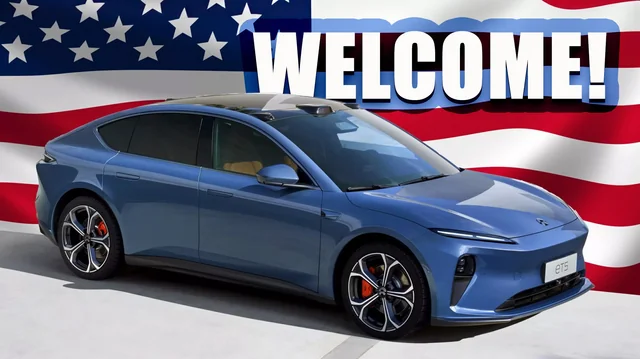Sino Evs Cars
Breaking Through Barriers: Chinese EVs Set to Hit the US Market Despite 100% Tariffs
The electric vehicle (EV) market is undergoing a significant transformation, with Chinese automakers leading the charge. Despite the recent imposition of a 100% tariff on Chinese-made EVs by President Joe Biden, several Chinese brands are determined to enter the U.S. market. These companies are leveraging innovative strategies and superior technology to bring their cutting-edge vehicles to American consumers. Here’s a look at some Chinese-made EVs that could make their way to the U.S. market despite the tariff hurdles.
Navigating the Tariff Challenge
The 100% tariff poses a substantial financial challenge for Chinese automakers looking to enter the U.S. market. However, several strategies can help mitigate these costs and make their vehicles more competitive:
Localization of Production:
Some Chinese automakers are exploring the possibility of establishing manufacturing facilities in the United States. By producing vehicles domestically, they can avoid import tariffs and potentially benefit from local incentives. This strategy not only reduces costs but also creates jobs and strengthens the brand’s presence in the U.S. market.
Strategic Partnerships:
Forming alliances with U.S.-based companies can help Chinese automakers navigate the complexities of the American market. Partnerships with established dealerships, technology firms, and production facilities can provide valuable local insights and resources, making the transition smoother and more cost-effective.
Premium Positioning:
By positioning their vehicles as premium, high-tech offerings, Chinese EV makers can appeal to a niche market willing to pay a higher price for advanced features and superior performance. This approach can help offset the added costs imposed by tariffs.
Prominent Chinese EVs Poised for the U.S. Market
Several Chinese EVs are well-equipped to compete in the U.S. market, offering a blend of innovation, luxury, and sustainability. Here are a few standout models:
NIO ES8:
The NIO ES8 is a luxury electric SUV known for its high performance and advanced technology. With a spacious interior, impressive range, and state-of-the-art autonomous driving capabilities, the ES8 is designed to compete with high-end American and European SUVs. NIO’s innovative battery-swapping technology also offers a unique solution to range anxiety, a significant concern for EV buyers.
BYD Tang EV:
The BYD Tang EV is a versatile and stylish electric SUV that combines luxury with practicality. It boasts a substantial driving range, fast charging capabilities, and a host of smart features, including an advanced infotainment system and robust safety technology. BYD’s extensive experience in battery technology gives the Tang EV a competitive edge in terms of efficiency and reliability.
Xpeng P7:
The Xpeng P7 is a sleek electric sedan that rivals some of the best offerings from American and European automakers. It features a long-range battery, cutting-edge autonomous driving systems, and a high-tech interior with smart connectivity options. Xpeng’s focus on software innovation and user experience makes the P7 an attractive choice for tech-savvy consumers.
Li Auto One:
The Li Auto One is a unique extended-range electric SUV that addresses one of the biggest hurdles for EV adoption: charging infrastructure. By combining an electric powertrain with a small gasoline engine that acts as a generator, the Li Auto One offers extended range and flexibility, making it particularly appealing for American consumers who may still be hesitant about fully electric vehicles.
Overcoming Market Challenges
Despite the challenges posed by the 100% tariff, these Chinese automakers are determined to succeed in the U.S. market. Their approach combines innovation, strategic partnerships, and a deep understanding of consumer needs. By focusing on the following areas, they can enhance their prospects:
Consumer Education and Outreach:
Educating American consumers about the benefits of Chinese EVs, including their advanced technology, sustainability, and unique features, is crucial. Effective marketing campaigns and participation in auto shows can help build awareness and trust.
Competitive Financing Options:
Offering attractive financing options and incentives can help offset the higher costs due to tariffs. By providing flexible payment plans, rebates, and trade-in deals, Chinese automakers can make their vehicles more accessible to a broader audience.
Robust After-Sales Support:
Establishing a strong after-sales network, including service centers and customer support, is essential for gaining consumer confidence. Ensuring reliable maintenance and support will be key to building a loyal customer base.
The Road Ahead
The journey for Chinese EVs entering the U.S. market is fraught with challenges, but the potential rewards are significant. As the demand for electric vehicles continues to grow, American consumers are increasingly looking for advanced, sustainable, and reliable options. By leveraging their technological prowess and strategic acumen, Chinese automakers are well-positioned to make a substantial impact, despite the current trade barriers.
The future of the automotive industry is electric, and Chinese EVs are poised to play a pivotal role in this transformation. With innovation at their core and a relentless drive to overcome obstacles, these vehicles are set to redefine the American EV landscape. The future is here, and it’s powered by the ingenuity and determination of Chinese electric car manufacturers.
